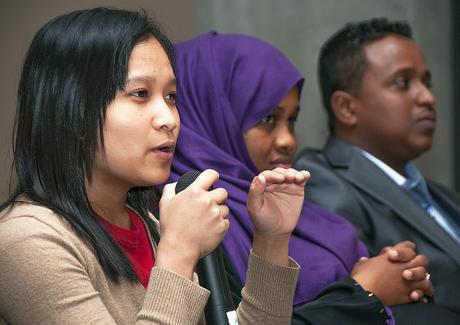
As the world moves ahead, diversity in the workplace will continue to grow and evolve. Additionally, thanks to the advancement of technology, it is now becoming more common to deal with clients, customers and employees from all over the world.
While this may be the new norm, the possible challenges of diversity cannot be ignored and should be recognized early on. Language barriers may make it difficult to communicate effectively, or cultural differences may inhibit employees from being comfortable enough to open up, socialize, bond or even work comfortably and closely with one another.
Jesmane Boggenpoel, author of My Blood Divides and Unites, uses the power of story to reconcile racial contradictions. Boggenpoel provides these ways companies can deal with cultural and racial conflicts internally and overcome cultural barriers.
Overcoming Cultural Barriers
Promote appreciation of cultural differences
Gather a small group or taking a 'corporate break-away or retreat to encourage team member to bond with one other, either by allowing everyone to share each other's journey, identity, forgiveness, choice and lingering emotions. This is especially useful when the team is being formed or a new team member joins the team.
Have an upfront discussion about team norms and company culture. This can include:
- Having a culture of empathy. As stated in My Blood Divides and Unites "that's because empathy - listening to the other person with an open heart and connecting with the other person's feelings even if you don't agree - can put you in the other person's shoes, and that can often be a catalyst for repairing and strengthening broken, even hostile, relationships...." This includes teaching understanding so we can relate to each other and find common ground.
- Encouraging team members to be inspirational leaders in a diverse and tolerant society. Discuss the traits of an inspirational leader. For example, instead of knee-jerk reactions and outbursts, an inspirational leader explores the roots of conflict, to 'fears of lacking,' and the negative effects of ones 'desire to dominate.'

Educate the team on the value of diversity.
Diversity helps with innovation and brings a diverse network to a business. It is essential that we realize that we have a subconscious bias in the ways we interact with others. Many people tend to interact with those who we have much in common with. In my book I discuss a number of studies that have looked at the benefits of diversity, including adding women to formerly all-male teams, and minorities to previously all-white teams. One such study one found that when women are added to previously all-male leadership teams in firms whose strategy is based on innovation, the firm's performance improves. Any study shows that when people of different races, political affiliations, and other markers of difference are brought together, they tend to work harder to prepare better, listen to each other more carefully, and treat contributions from racial or opinion minorities as novel information.
Try individual counseling.
A corporate should set aside funds from its corporate social investment or human resources budget for staff to receive counseling from past racial incidences which have caused trauma and hinder effective race relations going forward. This can improve team member effectiveness.
Having the team rally around a common cause.
There is power in bringing people together around a common cause. Technology is helping to solve some of humanity's most complex problems that affect lower-income people and address inequality. Teams can champion and get involved in such tech impact investing projects.
This guest post was provided by Jesmane Boggenpoel.

Reference:
Dezsö, Cristian L. and Ross, David Gaddis, Does Female Representation in Top Management Improve Firm Performance? A Panel Data Investigation (March 9, 2011). Robert H. Smith School Research Paper No. RHS 06-104. Available at SSRN: https://ssrn.com/abstract=1088182.

Ms. Career Girl was started in 2008 to help ambitious young professional women figure out who they are, what they want and how to get it.

